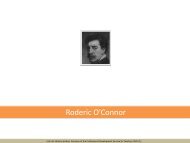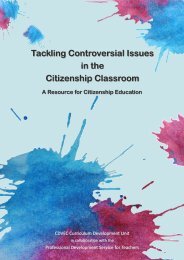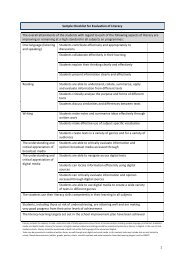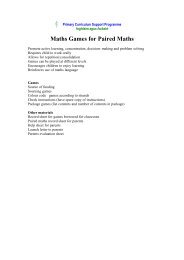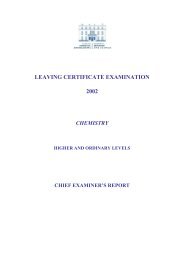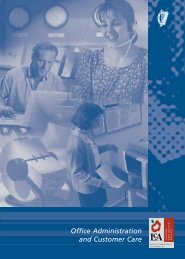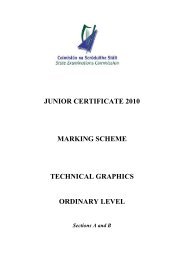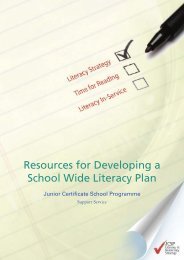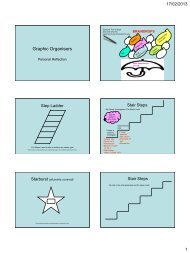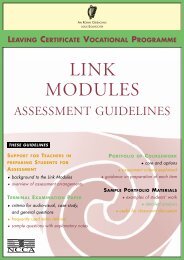What is Four in Balance? - PDST
What is Four in Balance? - PDST
What is Four in Balance? - PDST
You also want an ePaper? Increase the reach of your titles
YUMPU automatically turns print PDFs into web optimized ePapers that Google loves.
The debate concern<strong>in</strong>g the importance of <strong>in</strong>formation skillsand twenty-first century skillsThe examples given <strong>in</strong> Chapter 2 concern ICT applications that supportteach<strong>in</strong>g/learn<strong>in</strong>g, for example a practice program, a digital portfolio, orthe Internet. But to use such applications, pupils must have the necessaryskills, i.e. ICT or <strong>in</strong>formation skills. Information skills are so fundamental,both <strong>in</strong> educational sett<strong>in</strong>gs and <strong>in</strong> society <strong>in</strong> general, that they havebecome the subject of a major <strong>in</strong>ternational debate. <strong>What</strong> skills are wetalk<strong>in</strong>g about, and why are they so important?It <strong>is</strong> not entirely clear which skills are thought to be <strong>in</strong>formation skills. Inthe most general sense, they cons<strong>is</strong>t of all the skills that allow us to use ICTeffectively <strong>in</strong> order to function normally <strong>in</strong> today’s ICT-driven knowledgesociety. Th<strong>is</strong> goes further than basic skills such as read<strong>in</strong>g comprehensionor ICT skills such as the ability to use a computer. Information skills also<strong>in</strong>clude skills that enable us to deal responsibly, critically and creativelywith ICT (Van den Berg, 2010; Boelens, 2010; Maddux, 2009; Van Vliet,2011). Someone who has <strong>in</strong>formation skills <strong>is</strong> aware of security r<strong>is</strong>ks,can evaluate sources, and can produce <strong>in</strong>formation himself. He <strong>is</strong> also,however, aware of the ethical and legal aspects associated with the use ofICT and with <strong>in</strong>formation d<strong>is</strong>sem<strong>in</strong>ated on the Internet and through socialmedia. These wide-rang<strong>in</strong>g skills are sometimes referred to as “twentyfirstcentury skills” (Voogt, 2010b).Information skills are becom<strong>in</strong>g more and more important. It <strong>is</strong> grow<strong>in</strong>g<strong>in</strong>creas<strong>in</strong>gly clear, both <strong>in</strong> the Netherlands and abroad, that <strong>in</strong>formationskills are set to become the “new literacy” that every person must master(Anderson, 2008; Johnson, 2010). That means that <strong>in</strong>formation skills willsoon be just as vital as read<strong>in</strong>g, writ<strong>in</strong>g, and arithmetic. Anyone who hasnot mastered <strong>in</strong>formation skills will be at r<strong>is</strong>k of becom<strong>in</strong>g marg<strong>in</strong>alized(European Comm<strong>is</strong>sion, 2010; OECD, 2010a; Anderson, 2008; Boelens, 2010;Ten Brummelhu<strong>is</strong>, 2010).28



